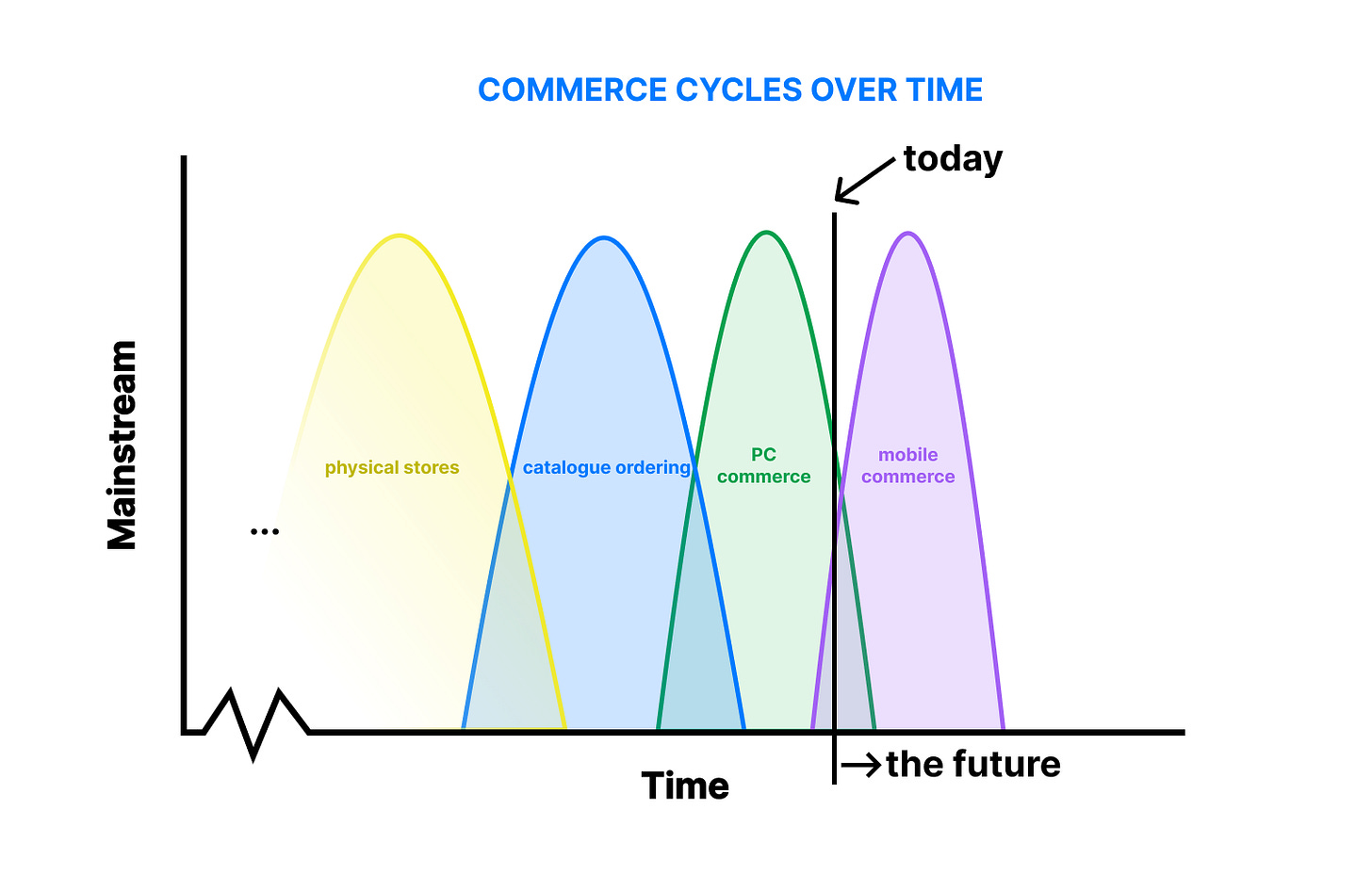Ordering Groceries With Your Brain Interface
How the Commerce Cycle shapes Humanity.
Social Commerce! Amazon FBA! Direct-To-Consumer!
How do I catch the next trend and profit from it!?!
Everyone likes to think of e-commerce as this recent explosive phenomenon… but commerce has been around for millions of years.
To understand where the future lies we must first look into the past and observe how consumer commerce cycles emerged and transformed humanity— and who profited.
In early history, we were apes, consisting of small hunter-gatherer tribes where goods were sourced from hunting and gathering, and shared.
Great for small close-knit groups, but not viable at scale.
After the Hunter-Gatherer phase, we entered the bartering commerce cycle.
Tribes traded with other tribes, allowing for specialization, and money began to emerge as societies became bigger.
As humanity’s food supply became more stable, we transitioned from roaming & trading tribes looking for food to having permanent small markets— markets where you could find “physical stores" of products.
It became the norm for humans to go to physical stores to purchase our products, whether it was the store on main street in Ancient Egypt, Rome, or America.
Companies like Macy’s and Walmart were the ones to profit from this, if you speak to people from the late 1800s/early 1900s, they’ll rave about Macy’s high-end stores.
Then we shifted from physical stores to purchasing catalog shipped goods.
Companies like Sears were the ones to profit from this, those who grew up in the mid-1900s will rave about catalogs where you could pick anything and have it delivered.
Then we shifted from catalog-shipped goods to Internet shopping— personal computer e-commerce.
At humanity’s fingertips were Internet “catalogs” of hundreds of millions of products.
Companies like Amazon were the primary ones to profit from this.
Now that we’re at today where Amazon is the main player…. what’s the next cycle?
Today, everyone purchases products by browsing through a bulky personal computer.
The next step is using our mobile smartphones to purchase our products.
We see this evidence of this through a growing number of purchases being completed via mobile and the majority of clicks driven from mobile social platforms.
Today, roughly 40% of all e-commerce purchases are made via mobile.
As a cycle, we are still relatively early.
The players in Mobile Commerce are not yet clear, but if previous cycles have taught us anything… the winners from the last cycles don’t tend to be the winners of the next.
So, if you’re an e-commerce startup or brand, build for mobile commerce.
But what determines when the next cycle happens?
The truth is that cycles are not just constrained by technology but, as common with humans, they are also constrained by social conservatism.
Most people who grew up shopping the Sears catalog never got used to shopping on the Internet.
If Amazon launched in the 1980s when the Internet was just entering the public— they probably would have failed like The Boston Computer Exchange.
Amazon had to wait for the next generation to comfortably grow up with the internet personal computer before they could truly capitalize on the idea of shopping online.
The same thing has happened with the iPhone… the next generation has comfortably grown up with the technology and has laid the groundwork for mobile commerce.
People were shocked when Mark Zuckerberg unveiled the Metaverse to an audience of people wearing VR headsets.
How could everyone be so absorbed by their devices!?!
We fail to see that today that the world already looks like this with smartphones, but we’re too desensitized to notice it— because we grew up with it.
So what’s even further ahead in the human evolution of commerce?
Gary Vaynerchuk & Amazon think it’s voice personal assistants, Tim Cook & Zuckerberg think it’s AR/VR, and Elon Musk thinks it’s brain interfaces.
They are all correct, future consumer commerce cycles will have all of this.
Technology’s evolution is exponential.
It took 100,000s of years for our species to develop from hunter-gatherer societies to trading societies.
It took 10,000s of years to progress from trading societies to physical stores.
It took 1,000s of years to progress to a shipped catalog society.
It took 100s of years to advance to a PC commerce society.
It will only take 10s of years to progress from PC commerce to mobile commerce, and after that…. we can only imagine the rate human commerce will advance at.
We’re getting close to the point where commerce cycles are only constrained by the ability of people to learn and accept new things within a generation.
The next few commerce cycles will look like this:
It’s almost impossible to imagine more than two cycles into the Future— we must climb the peak ahead before we can catch a glimpse at the next one.
We will likely go Mobile → Digital Assistants → AR/VR → Brain Interfaces.
We could skip straight from mobile commerce to AR/VR if Meta and Apple push hard enough, and there could be a cycle like fully predictive AI commerce between AR/VR and direct brain interfaces.
That cycle after AR/VR depends on how fast it becomes socially acceptable to have a brain interface.
The close Future is predictable— but who knows what the far Future holds?
The technology of the far Future is indistinguishable from magic.








